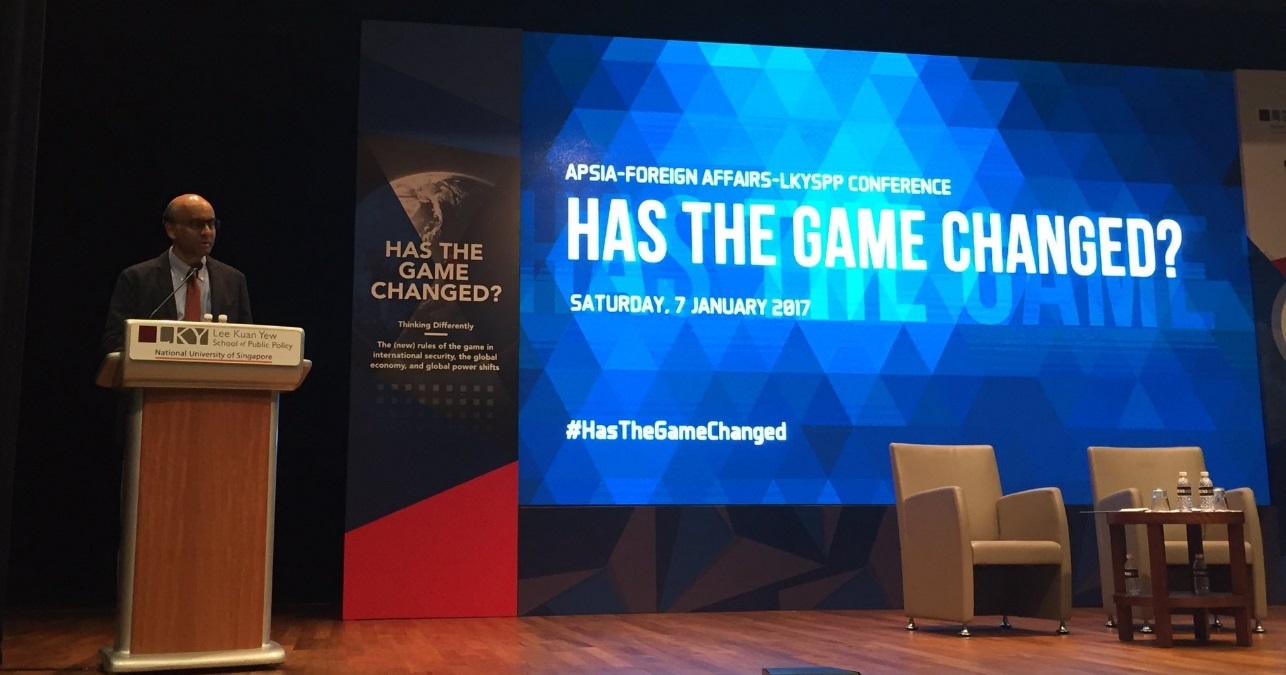With political upsets like Donald Trump's election as the next U.S. President and the UK's Brexit vote, has the global "game" changed for everyone?
This was the topic Deputy Prime Minister (DPM) Tharman Shanmugaratnam was asked to tackle at an international relations conference ("Has The Game Changed?"), organised by the Lee Kuan Yew School of Public Policy on Jan 7.
Join us as we welcome newly appointed Chairman of the G30 DPM @Tharman_S to present his keynote address. #HasTheGameChanged pic.twitter.com/Pz2Pwp8525
— Lee Kuan Yew School (@LKYSch) January 7, 2017
And DPM Tharman certainly did not disappoint the 350 academic and public policy wonks in the audience.
In the span of just 22 minutes, he gave them a taste of his awesomeness a clear demonstration of why he is one of Singapore's top politicians.
His weapon: a succinct speech on how the world has gotten here and what we can do to get out of this rut.
Here, we summarise Tharman's four suggestions on how we can change the world:
First, Tharman outlined four major trends that have contributed to a shift in politics in most nations, which he said that it should be "no surprise that it lead to surprises":
4 trends to watch: stagnant wages, decline social mobility & sense of togetherness, increasing polarization in politics. #HasTheGameChanged
— Lee Kuan Yew School (@LKYSch) January 7, 2017
1) Stagnant wages (and incomes) — not just for those at the bottom end of the income ladder, but for the middle class in countries like the United States and Japan.
2) General decline in social mobility across the advanced world, even those with higher rates of social mobility like Germany and Sweden. People know that their chances of moving up in life are less than they used to be if they start off at the bottom. They get a sense that society is not reshuffling, or favouring meritocracy, the way it used to.
3) A loss of a sense of togetherness in society, where people no longer think of themselves and society in terms of "we" but in terms of "us against them". Rural versus metropolitan is a good example of this.
4) An increasing polarisation of politics caused by a decline in trust in governments, voter apathy, especially the young, and reinforced by a new phenomenon -- social media -- which has now become the dominant gate through which "news" is filtered to reinforce people's bias.
Second, Tharman outlined four ways each nation can tackle these challenges through their own domestic policy responses:
1. Regeneration of cities left behind through close collaboration with government, schools and employers: Cities left behind by globalisation are reflections of "creative destruction", trade and technological trends, geography and a reflection of new demands and old demands, with new products and services replacing old ones.
2. Regeneration of people's careers, not redistribution of incomes in societies
This line from Tharman bears quoting in full:
"You need redistribution in society, and you may need more in some areas, but it's not at the heart of the matter... Redistribution doesn't give hope. Regeneration is what brings hope because you allow individuals, communities and cities to rise through their own abilities".
This means governments need to reinvest in people and help their citizens regenerate their careers throughout their lives through skills training. He noted that while the first 18 years of our life is a "useful foundation" and "a strong base", it may give one a "false sense of how well we do in life".
3. Regeneration of neighbourhoods through active urban planning that goes beyond utilities: This is because neighbourhood issues and the composition of a neighbourhood determine social mobility, and a sense of how people thrive or do poorly together. Neighbourhood policies must discourage segregation, so that communities can do well together.
4. Regeneration of "the politics of the centre": This means a return to politics that is "honest with the people". This includes the need to look long-term, because each of the major challenges "require actions that only pay off over multiple electoral cycles". For example, American politicians on the left and right in conventional politics have neglected issues that have resulted in the U.S. pension crisis, as well as their problems related to healthcare funding.
Oh, did we mention that he gave this lecture without reading from any prepared speech?
Mic drop.
Top photo from Twitter.
If you like what you read, follow us on Facebook and Twitter to get the latest updates.
If you like what you read, follow us on Facebook, Instagram, Twitter and Telegram to get the latest updates.
